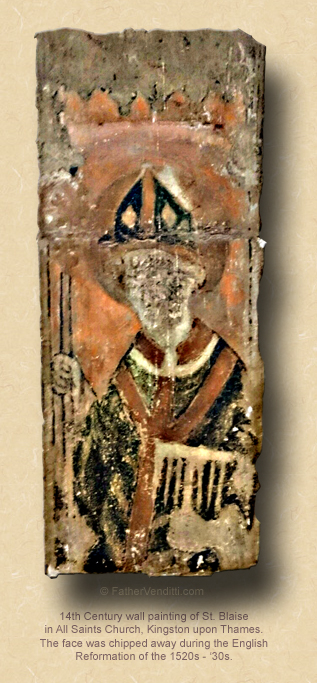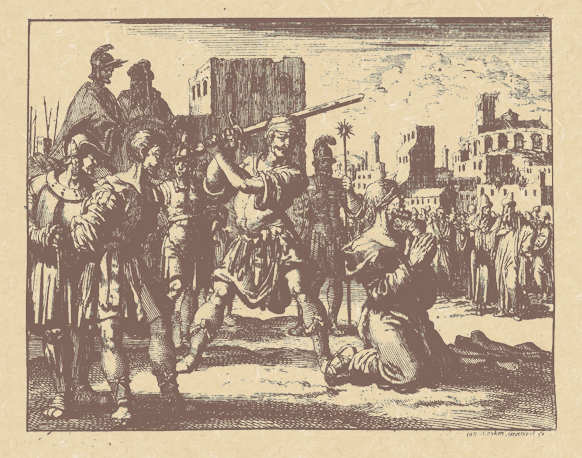I Do Not Recommend the Fish.
The Fourth Wednesday of Ordinary Time; the Memorial of Saint Blaise, Bishop & Martyr; or, the Memorial of Saint Ansgar, Bishop.
Lessons from the secondary feria, according to the ordinary form of the Roman Rite:
• II Samuel 24: 2, 9-17.
• Psalm 32: 1-2, 5-7.
• Mark 6: 1-6.
Sexagesima Wednesday; and, the Commemoration of Saint Blaise, Bishop & Martyr.
Lessons from the dominica,* according to the extraordinary form of the Roman Rite:
• II Corinthians 11: 19-33; 12: 1-9.
• Psalm 82: 19, 14.
• Psalm 59: 4, 6.
• Luke 8: 4-15.
Cheesefare Wednesday; and, the Synaxis of the Holy Prophet Simeon & the Prophetess Anna.
There is no Divine Liturgy today.**
FatherVenditti.com
|
 10:14 AM 2/3/2016 — Today's Gospel lesson is Saint Mark's abbreviated version of what took Saint Luke two Sundays to tell us: our Blessed Lord's visit to His home town synagogue in Nazareth. When I posted that homily on my web site I included a photo of the inside of that very synagogue, which is not only preserved, but which is now a church called the Synagogue Church, and which is now the possession of the Greek Catholic mission in Jerusalem. 10:14 AM 2/3/2016 — Today's Gospel lesson is Saint Mark's abbreviated version of what took Saint Luke two Sundays to tell us: our Blessed Lord's visit to His home town synagogue in Nazareth. When I posted that homily on my web site I included a photo of the inside of that very synagogue, which is not only preserved, but which is now a church called the Synagogue Church, and which is now the possession of the Greek Catholic mission in Jerusalem.
Mark doesn't tell us the subject of our Lord's homily in Nazareth the way Luke did; in fact, Mark chooses instead to focus on what was only a passing reference in Luke's account: the questions raised about our Lord's origins, probably arising—you may recall from the suggestion I made last Sunday—from the jealousy of the professional rabbis who were in attendance that day to hear our Lord preach. Mark doesn't say anything about them wanting to throw our Lord over a cliff like Luke did; instead, he mentions something much more curious. I like Monsignor Knox's translation of the line best: “It is only in his own country, in his own home, and among his own kindred, that a prophet goes unhonoured” (6: 4 Knox). It sounds all the world like he's quoting something, but no reference is given, and it's not familiar. If our Lord is quoting something He's read, it's not the Scriptures; more likely it's just a saying. The curious part is what the Evangelist tells us right after this: “So he was not able to perform any mighty deed there, apart from curing a few sick people by laying his hands on them” (v. 5 NABRE).
Scripture scholars debate at great length whether the “mighty deeds” being referenced are miracles—the Greek word Mark uses is δύναμιν, which means exactly as it's given here: “mighty deed”—but, since we know our Lord has already performed some miracles at this point, they probably are. What's interesting is Mark's suggestion that He's not able to perform any because they won't honor Him. It's a point I had made several times last summer when I was privileged to speak on the 13th when speaking about the Miracle of the Sun: our Lord's miracles—with the exception of the raising of Lazarus—are not meant to prove to anyone who He is or bring people to faith, but rather are rewards for having made an act of faith. They didn't make one in Nazareth, so He didn't do any … except for one: He cured their sick.
It's totally unclear why He makes this exception. Probably it's because the sick are that way through no fault of their own, which, you'll recall, is consistent with our Lord's challenge to the Semitic notion that illness is the result of sin. And, as you know, throughout all the Scriptures illness is an analogy for sin. It's the reason that the sacrament of confession is the only sacrament you don't have to be in the State of Grace to receive.
It's a happy coincidence that this lesson is read on the Memorial of the bishop and martyr Blaise. We know absolutely nothing about him. What we think we know about him comes from a book called The Acts of Saint Blaise, written in Greek some four or five hundred years after the date it gives for him, which is sometime in the 3rd or 4th centuries. It tells us that he was a physician who became a priest and later bishop of Sebaste who was known for his sound teaching and for performing many miraculous cures, and who was martyred during the persecution of Emperor Licinius. The blessing of throats we do on this day stems from a legend***—and it's only a legend—about how, while Blaise was being taken into custody, a distraught mother, whose only child was choking on a fish-bone, threw herself at his feet and implored his intercession. Touched by her grief, he offered up his prayers, and the child was cured. Consequently, Saint Blaise is invoked for protection against injuries and illnesses of the throat.
What I would like you to reflect upon today—aside from how we need to be cautious when eating fish—is the fact that our Blessed Lord did no miracles for his adopted home town because of their lack of faith in Him, which is important to remember during those times when we find ourselves in the midst of some sort of dark night, as I mentioned yesterday, and looking for some sort of consolation from our Lord. The act of faith and hope must come first.

* As throughout the year, the lessons from the previous Sunday are repeated on ferial days.
** The Churches of the Byzantine Tradition do not celebrate the Eucharist on weekdays during the Triodion and the Great Fast, except on significant feasts.
*** Vollet, E. H., Grande Encyclopédie s.v. Blaise; published in Bibliotheca Hagiographica Graeca "Auctarium", 1969, 278, col. 665b.
|

